The Integrated Sustainability Business Model
For Reale Group, sustainability is a key tool to support not only the Group’s competitiveness and reputation, but also its profitability. For this reason, sustainability is no longer seen as an addition to strategic and operational activities, but as an integral part of the Business Model.
The concept on which the entire Sustainability Model is based is therefore integration: integrated thinking, in fact, represents a holistic way of thinking about business activities, in all phases, from strategic planning, to monitoring, to reporting.
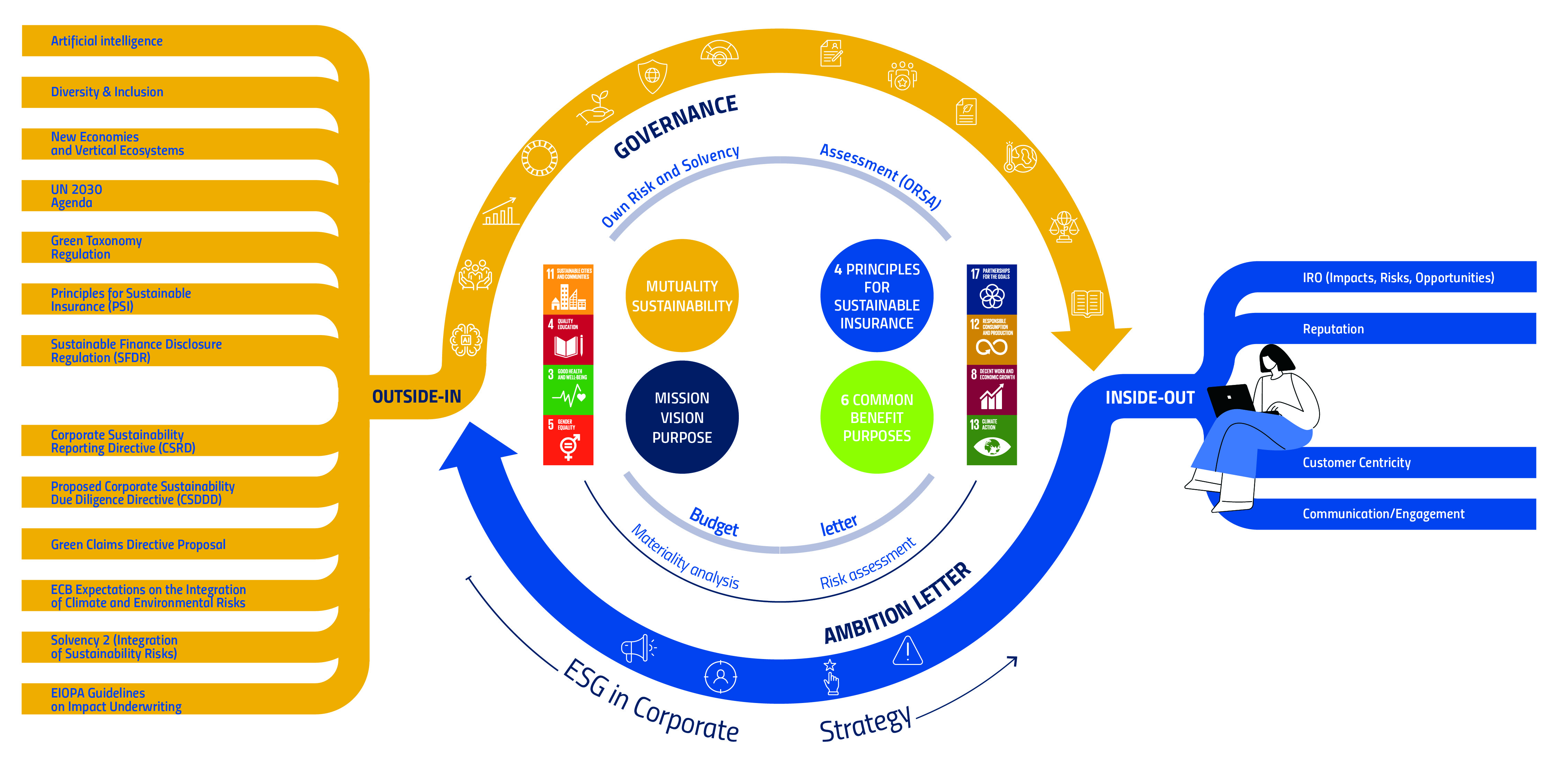
Mutuality and Sustainability
Mutuality and Sustainability are the principles that guide Reale Mutua and that inspire the action of all the Group’s Companies, highlighting their essence and distinctiveness on the market in terms of reliability, seriousness, quality of service and ability to better interpret and satisfy the needs of customers and the territory. Sustainability is a distinctive factor in the strategic positioning of Reale Group, also demonstrated by Reale Mutua’s qualification as a Benefit Company (2022).
Mission, Vision e Purpose
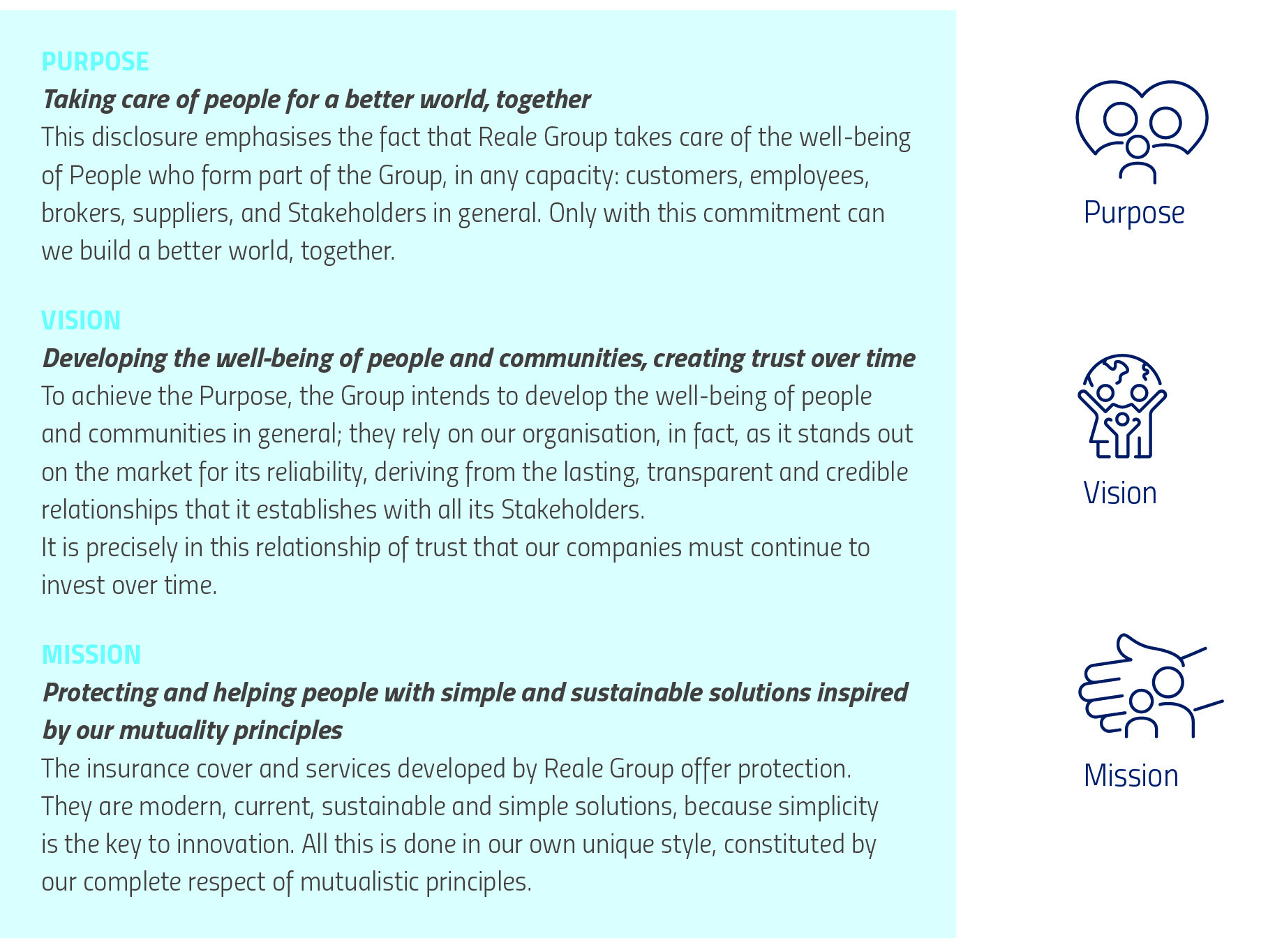
Benefit Company and Common Benefit
In 2022, the Holding Company Reale Mutua became a Benefit Company. This step has been an important step in an ambitious path already started within the Reale Group that aims at an ever greater integration of ESG issues in business processes and that has led to the amendment of Reale’s Articles of Association Mutua, incorporating in the Company’s mission the objective of pursuing, together with economic profit, the following six Common Benefit Purposes.
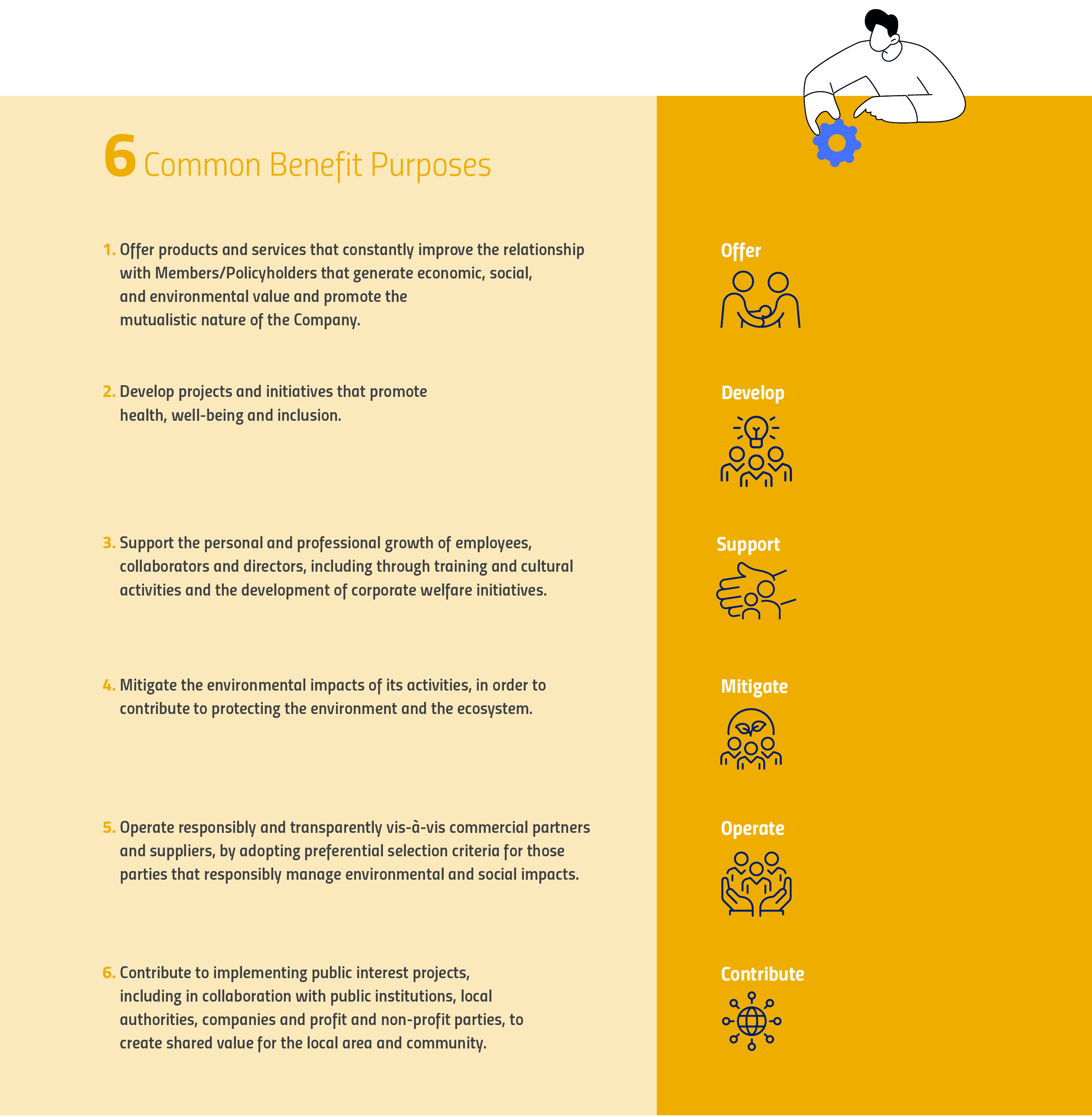
This shift has switched the focus of the sustainability strategy from a more traditional approach based on voluntary and discretionary ESG actions towards the intentional pursuit of a "benefit purpose" aimed at generating intentional, measurable and additional impacts on stakeholders.
Principles for Sustainable Insurance
Reale Group joined UNEP FI Principles for Sustainable Insurance (PSI) in March 2023. Launched in 2012 at the UN Conference on Sustainable Development, the PSI) represent a global framework for the insurance sector to address environmental, social and governance risks and opportunities. Sustainable insurance is a strategic approach in which all activities in the insurance value chain, including stakeholder interactions, are carried out in a responsible and forward-looking manner, identifying, evaluating, and managing and monitoring risks and opportunities associated with environmental, social and governance factors. It aims to reduce risk, develop innovative solutions, improve business performance and contribute to environmental, social and economic sustainability.
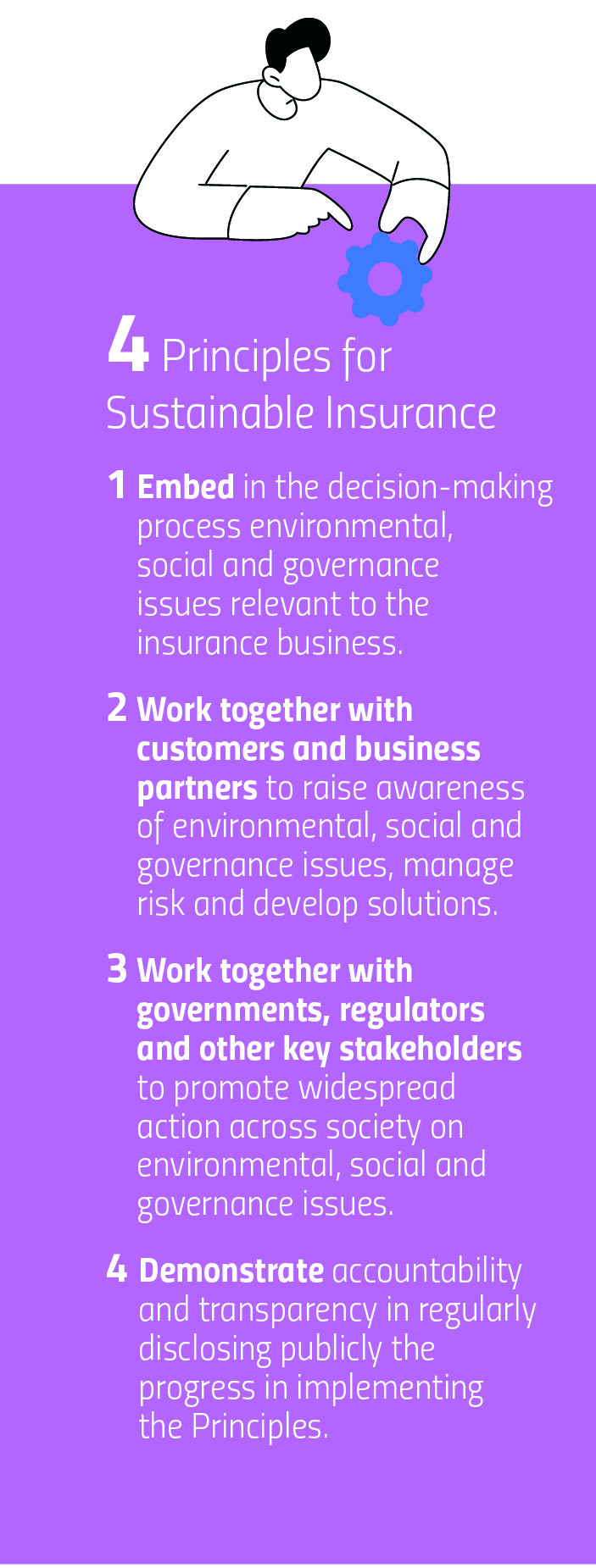
Stakeholders and materiality analysis
The relationship with stakeholders is part of the integrated approach pursued by the Group, which is also expressed through listening and understanding of their needs and expectations through actions of continuous improvement of the quality of the service offered and better accessibility and transparency of information.
Reale Group has identified the following main categories of stakeholders (Stakeholders), understood as those "individuals, groups of individuals or entities that influence or are influenced by the Group, its activities and the impact that these generate in economic-patrimonial, social and environmental terms":
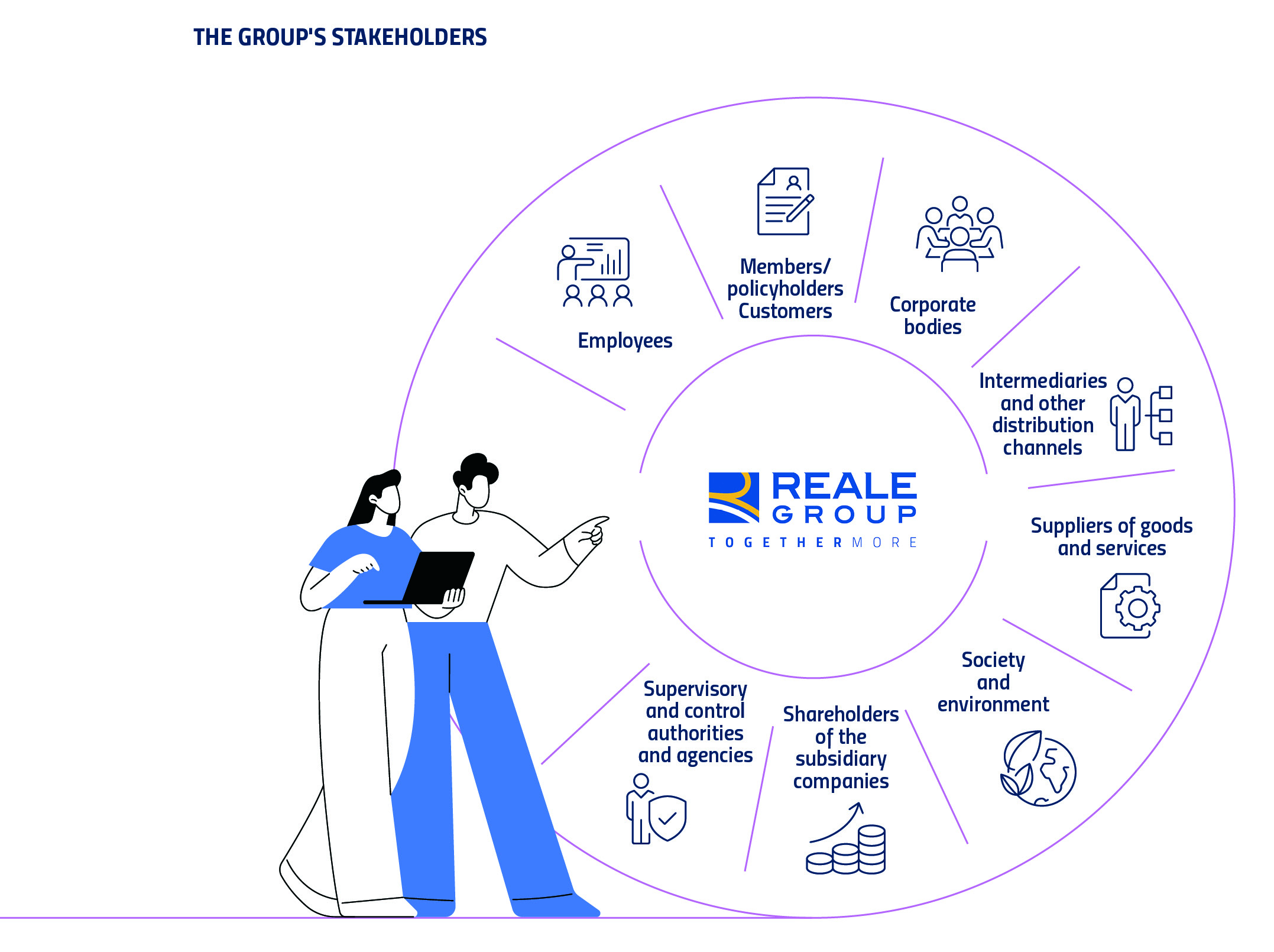
The process for identifying and assessing Reale Group's impacts, risks and relevant opportunities is based on a double materiality analysis, as required by the ESRS regulation, which takes into account a dual perspective: on the one hand, the materiality of the impact and, on the other, the financial one.
The impact materiality analysis adopted an "inside-out" approach, examining the effects that Reale Group generates on people, the environment and communities, both inside and outside the organization, with a short, medium and long-term time horizon. Conversely, the analysis of financial materiality followed an "outside-in" approach, assessing how external factors may influence Reale Group and its economic and financial results, considering both internal and external elements of the Group, along the entire value chain, in the short, medium and long term. The sustainability issues considered during the process concerned environmental, social and governance issues for the 2024 financial year.
The analysis carried out took into consideration the entire value chain of Reale Group, in Italy and abroad, including its products, services and business relationships. In particular, the segments analyzed were: Own Operations, Suppliers, Investments, Underwriting, Credit and Distributors.
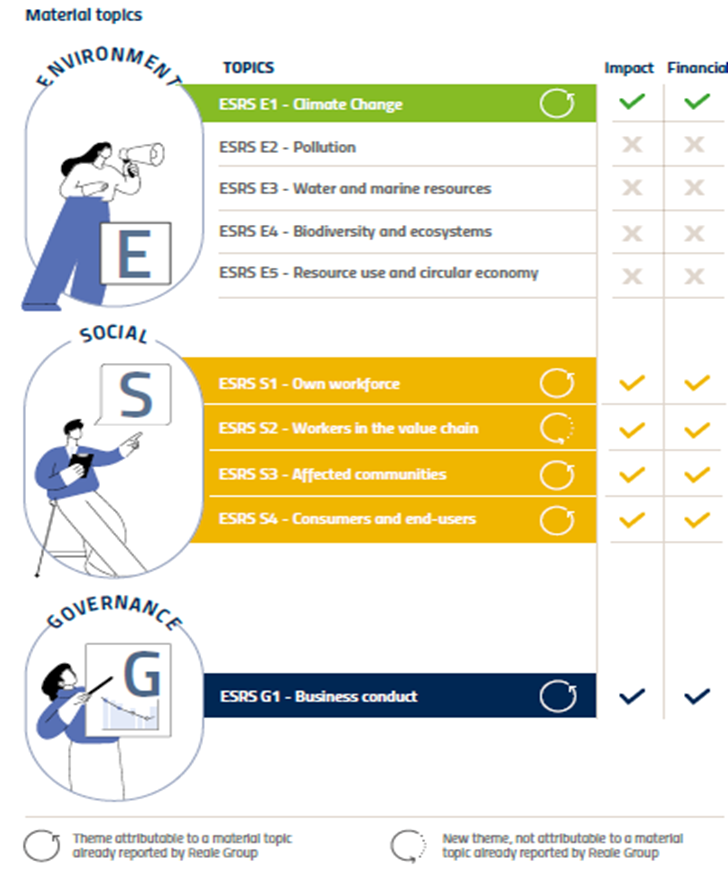
Real foundation: community support and impact philanthropy
Since 2018, in just 6 years of activity, Reale Foundation has contributed to make a significant impact on the communities it serves by fostering the creation of an environment where partnerships between public and private institutions are believed to be the most effective tools for finding solutions to specific social needs.
8.8 million euros granted to third sector entities;
446 initiatives supported by Reale Foundation in Italy, Spain and Chile;
10 million euros allocated for the fight against Covid-19, 2 vaccine hubs, 300 volunteers involved 219,000 vaccinations provided, 2 million direct and indirect beneficiaries reached.
Networks and associations
Reale Group actively participates in national and international networks, alliances and associations that aim to seek incentives and opportunities for discussion on issues related to innovation, mutuality, sustainability in the insurance sector, banking and services.
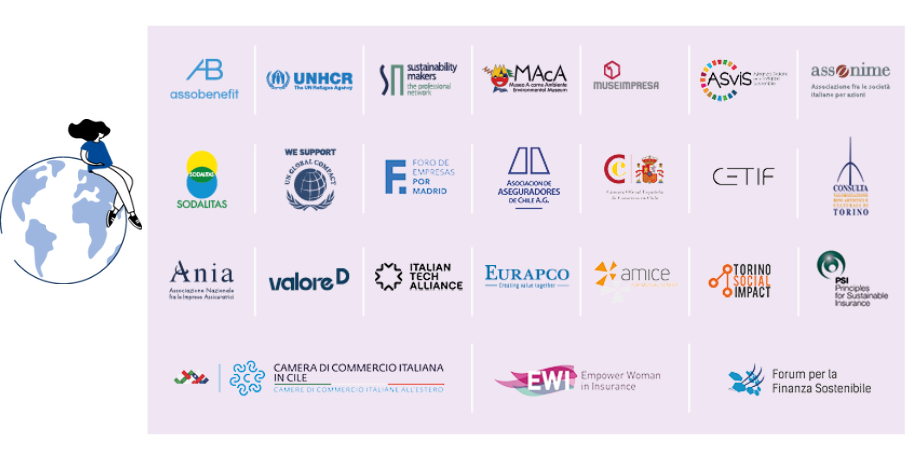
Reale Group Environmental Management System
In 2012 Reale Mutua was the first Italian insurance company to voluntarily obtain the UNI EN ISO 14001 Environmental Certification; in the following years this approach was extended to all Group Companies (2017) with the exclusion of Reale Chile Seguros, Plurima and Ydrogios and also several insurance agencies in the territory.
The scope of application of the Management System also extends to all the Group’s peripheral locations, which are excluded from the scope of the certification.
The adoption of the international standard UNI EN ISO 14001 requires business organizations to equip themselves with a Management System of their environmental impacts, with a view to continuous improvement of their performance related to these impacts. Through the Environmental Management System ISO 14001, Reale Group not only ensures its compliance with environmental legislation, but defines processes and objectives related to the prevention of pollution and the depletion of energy resources and the management of waste products.
The implementation of the UNI EN ISO 14001 standard is therefore the approach that Reale Group has chosen as the main governance tool to support the continuous improvement of direct and indirect environmental performance and spread the environmental culture inside and outside of their own Organization. These requirements are now part of the corporate culture and are fully acquired and shared in procedures and processes.
During 2023, Reale Group updated the operating methods of the Environmental Management System (see section on Really "Documents Environmental Management System") with the aim of achieving an ever-deeper integration of the guiding criteria of environmental sustainability in the material business processes to the activity of the organization. With the occasion, Reale Group has declined its identity as a purpose-oriented company through the update of the Group Guidelines in the environmental field, with which it identified the Group’s commitments to continuously improve its environmental performance.
Through the Real Group Environmental Management System:
- identify and assess the direct and indirect impacts of its organisation on the environment;
- measure and, where possible, mitigate or offset the Group’s direct and indirect environmental impacts;
- ensure analysis and compliance with environmental compliance requirements;
- in accordance with the principle of transparency and in accordance with the rules in force, report regularly on the progress of environmental indicators and the related actions taken to optimise consumption;
- has a positive influence also on its business partners through the application of its Supplier Code of Conduct, which defines, among the requirements for access to the Register, the application of a responsible conduct also in the environmental field;
- involves the agencies to create an effective channel of dissemination of the values of which Reale Group promotes.